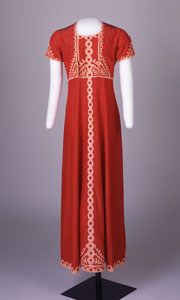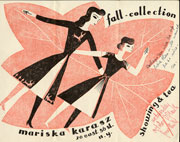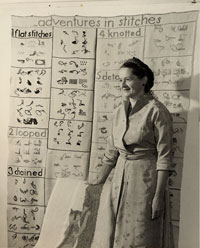Introduction
Mariska Karasz (1898, Budapest, Hungary - 1960, Danbury, Connecticut) was an Hungarian-American fashion designer, author and textile artist. Mariska began her career as a designer of modern clothing for women in the 1920s and for children in the 1930s. The women’s clothing she designed in her small custom studio incorporated traditional embroidery from Hungary and modern appliqués, similar to Henri Matisse’s cutouts, of abstract designs and stylized, natural motifs, often inspired by the folk arts of her native country.
The women’s clothing she designed in her small custom studio incorporated traditional embroidery from Hungary and modern appliqués, similar to Henri Matisse’s cutouts, of abstract designs and stylized, natural motifs, often inspired by the folk arts of her native country.
In the mid-1940s, after a divorce, a studio fire and World War II, Karasz consciously reinvented her career. While still using her chosen medium, she approached textiles in a manner more closely related to a fine arts tradition, creating embroidered wall hangings.
Madelyn Shaw Curator of Costume and Textiles, at the Museum of Art, Rhode Island School of Design provides a historical perspective of Mariska Karasz work.
Karasz exhibited her embroideries in museums and galleries across the country, in more than 60 solo exhibitions during the 1950s. She also authored the book Adventures in Stitches: A New Art of Embroidery in 1949 and worked as guest needlework editor at House Beautiful in 1952-53, introducing artistic embroidery to a vast domestic audience. She is credited with encouraging a revival of needlework in America and initiating a creative approach to the field.
Adventures in Stitches: A New Art of Embroidery in 1949 and worked as guest needlework editor at House Beautiful in 1952-53, introducing artistic embroidery to a vast domestic audience. She is credited with encouraging a revival of needlework in America and initiating a creative approach to the field.